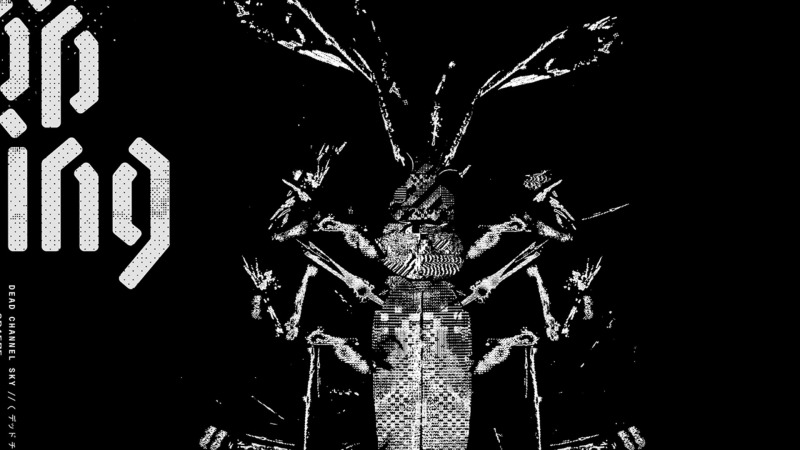On Dead Channel Sky, clipping. Ask What Happened
On their most immediate and vital album yet, the LA rap trio reimagine a cyberpunk-inspired present and future.

“The sky above the port was the color of television, tuned to a dead channel.” The opening line of William Gibson’s 1984 novel Neuromancer is as evocative as it is vague. When Gibson references the static snow of pre-millennium tube televisions, he is essentially saying the sky is gray. But, he likely also meant to evoke that unnameable and disorienting sense of dread induced by menacing white noise and crawling black and white granules of light.
Dead Channel Sky, the fifth studio album from experimental LA hip-hop trio clipping.—rapper Daveed Diggs and producers Bill Hutson and Jonathan Snipes—uses Gibson’s port sky as its first aesthetic touchstone. The concept is at once familiar and alien. Cyberpunk, a literary movement which began in earnest with Neuromancer, offers a version of the future where our obsession with technology has advanced at the expense of everything else, where worlds shine like chrome, sound like digital noise, and feel like the end of everything.
Dead Channel Sky is clipping.’s first foray into cyberpunk, though it almost feels like an inevitability. Generally defined by its focus on “low-life and high tech,” cyberpunk is obviously fertile ground for clipping., whose combinations of expertly produced noise and sharply observant storytelling have found the threesome exploring tales of degradation, cruelty and hope through Afrofuturist and horrorcore lenses, tuned precisely to cultural moments past and present.
The groundwork for Dead Channel Sky was laid in 2019, when the group was invited to contribute a song to a cyberpunk themed video game. Though they didn’t finish the song (album single “Run It”) in time for it to be included, they liked it enough to build an entire record around it. Thanks to clipping.’s masterful ability to immerse their listeners in conceptual world-building, it’s easy to imagine the driving beat of “Run It” and the rest of the album’s songs soundtracking the chrome and neon dystopias the band pulls from.
Dead Channel Sky’s “Intro” drops listeners in with no warning—as with previous records, we’re greeted by Diggs introducing the album in that coldly menacing tone, supported only by a bed of noise. Here, it’s the grating ring of a dial-up modem, distorted even further by Hutson and Snipes’s characteristic use of musique concrète. Diggs ends the intro with the group’s signature phrase—“It’s clipping., bitch”—for the first time in full since their Sub Pop label debut CLPPNG (which celebrated its 10th anniversary last year), the phrase now sounding less like a brash entrance and more like a pointed warning.
clipping.’s detractors have often criticized the group for a perceived inaccessibility in their music and approach, due in part to the barrage of samples and references built into clipping.’s creative DNA. To those critics’ credit, it is overwhelming. But on Dead Channel Sky especially, overload is the point. And for those who take an interest in rabbit holes, there are endless tunnels to explore.
Like all of clipping.’s albums, Dead Channel Sky is dense and structured through layers of reference. The band has always worked from a concept-forward perspective, and the songs here are littered with the vocabulary of the very same ‘80s science fiction the album it draws inspiration from; the three music videos released so far (“Run It,” “Change the Channel,” and “Welcome Home Warrior”) also borrow the lo-fi cyber aesthetic of films like Blade Runner, Johnny Mnemonic and The Matrix. Aside from the nod to Neuromancer in the album’s title, the hard-hitting “Code” also contains a number of other Neuromancer hallmarks, including a dangerous psychoactive drug called Blue Nine, emphasizing the album’s running theme of disengagement—from reality or from oneself.
The silky, uncharacteristically buoyant house track ”Mirrorshades pt. 2,” which features the hypnotic voices of Canadian hip-hop duo Cartel Madras, references both the 1986 cyberpunk anthology Mirrorshades and Information Society’s 1990 song “Mirrorshades,” an ode to Gibson’s recurring character Molly Millions (aka Razorgirl), who Diggs also namedrops in “Code.” Additionally, much of the album’s sonic landscape contains the building blocks of ‘80s electro, a genre born out of early hip-hop in New York that also tended toward Afrofuturist, science fiction-based aesthetics.
-

-

-

-

-

-

-

-

-

-

-

-

-

-

-

-

-

-

-

-

-

-

-

-

-

-

-

-

-

-

-

-

-

-

-

-

-

-

-

-








































